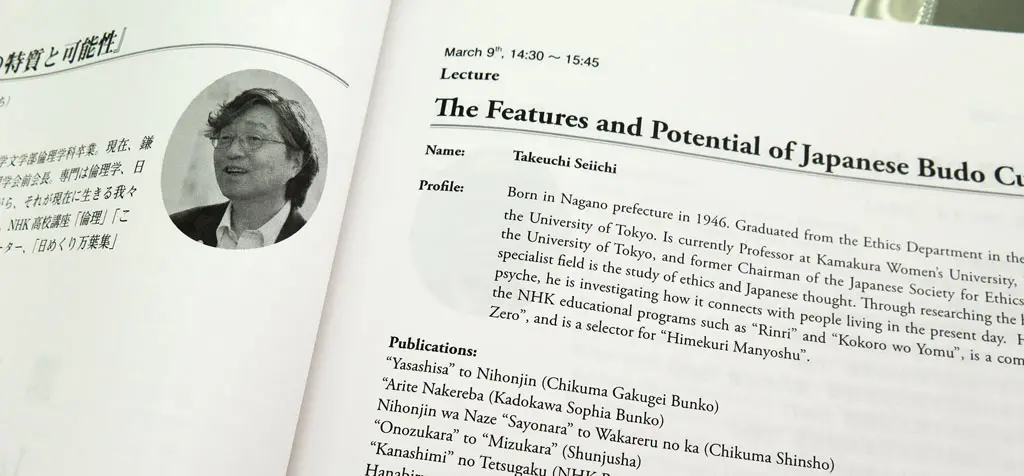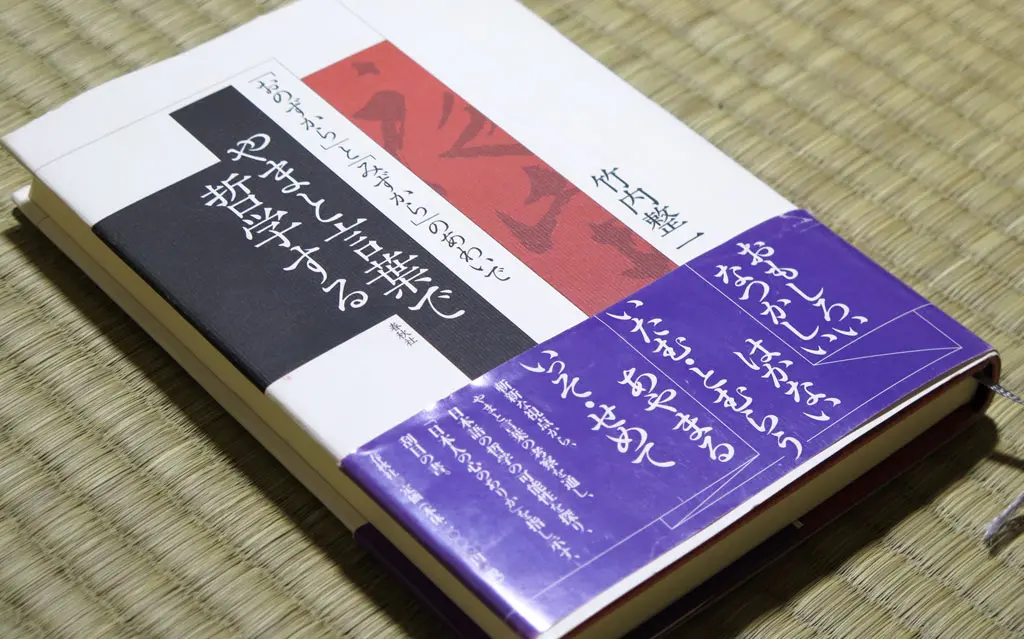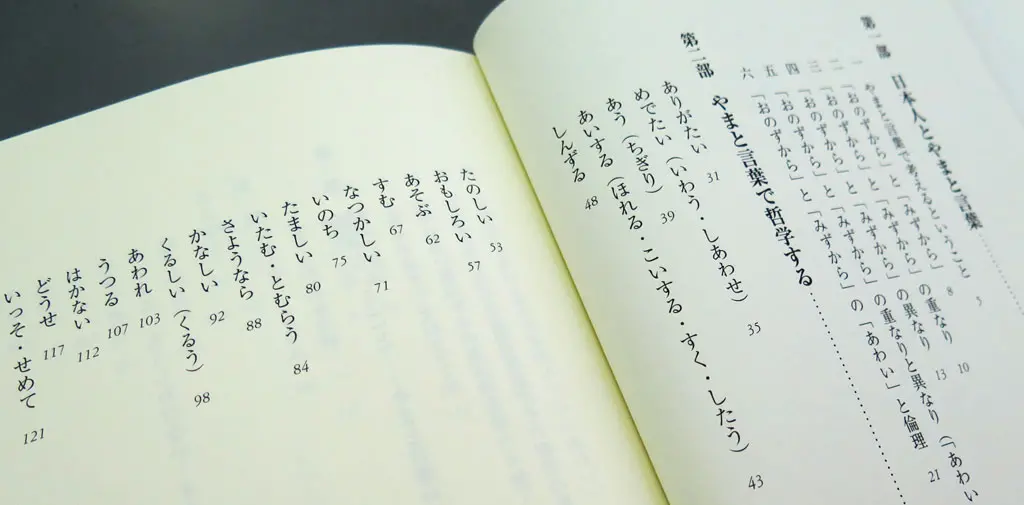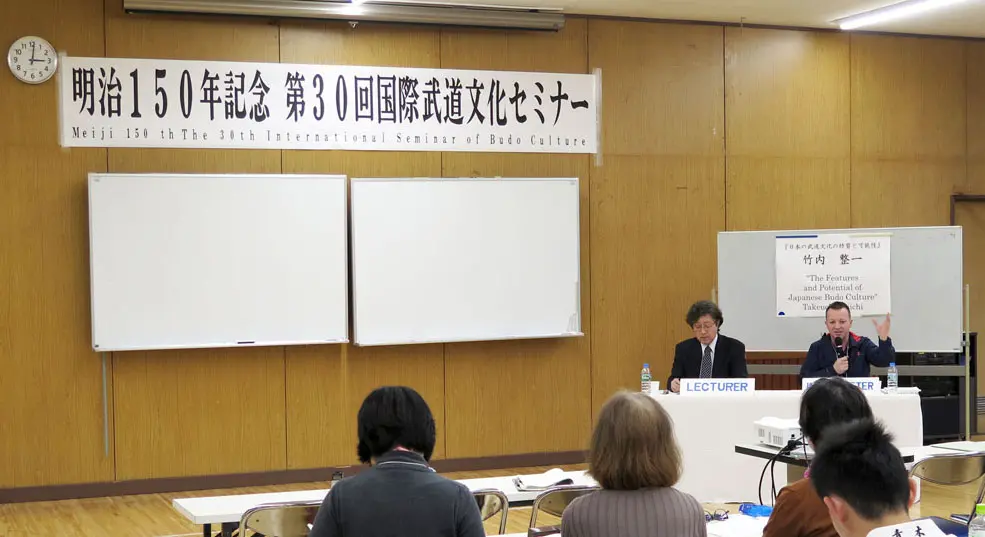Last weekend, I attended the 30th Annual International Seminar of Budo Culture, which coincided with the 150th anniversary of the start of the Meiji era in Japan. This year’s main lecture was The Features and Potential of Japanese Budo Culture given by Seiichi Takeuchi 竹内 整一. He is currently a professor at Kamakura Women’s University, and former professor of the University of Tokyo. His field is the study of ethics and Japanese thought.
The lecture was given in Japanese and translated into English by Alex Bennett, who is currently a professor at Kansai University and has written and translated many books on the Japanese Budo arts.
This was my 3rd time attending the seminar. Every year I’m able to get amazing insights into budo martial arts and learn about their connection to Japanese psychology and culture. I previously wrote about the main lecture from the first seminar I attended two years ago: March 4th, 2016.
Overall, I felt the contents of the lecture did not match the title, but the main idea expressed in the lecture was another fascinating look at an explanation for Japanese culture. The theme carried through the explanations and examples was that of onozukara and mizukara
Takeuchi先生 explained the cooperative duality of these two forces behind the decisions and actions of people in Japanese culture and society.
Onozukara おのずから - 自然の働く
Mizukara みずから - 自分の能力
Let’s do mizukara, first. Mizukara is the effect from oneself. It’s the idea that an action or decision you made came as a result of your own willpower. Onozukara is the workings of nature, the idea that there is an overwhelming force behind a decision or action that made or allowed it happen.
Mizukara is pretty easy to understand, but Onozukara is much more ambiguous. In western countries, onozukara could be similar to the will of god. God is an outside influence, and people often thank God for giving them fortunes, or blame God for misfortunes. This was brought up in a question after the lecture had finished.
But for Japanese people, the idea of God is not a singular entity. Takeuchi先生 mentioned if you asked a Japanese person who they pray to when they pray, they would not have an answer. They wouldn’t know. The will of nature is a result of many different factors and moving parts within the world and society.
As another example, another question was asked, "Did you decide to do this lecture? Or was it the will of nature?" He replied that he did want to do lecture, but he was also asked by many people to do it. The people he knew and the connections he’s made throughout his life knew his expertise that made him qualified to give a lecture on this subject. In that way, there was a force that created the opportunity for him to accept. So, this lecture was a result of the actions of both nature and self.
So, the idea of onozukara is the force of everything around us. It’s the connections we’ve made with people in our lives, the opportunities society gives us, and nature itself. It is not, directly, "the will of God."
These two concepts aren’t something that is thought of on the surface level. People aren’t consciously thinking about the will of themselves or nature when making decisions. But there are examples within the Japanese language that build on this idea.
The main example given was I am to be married 結婚することになった. When people get married in Japan and they announce it to their family and friends, they use this phrase. It’s very passive and reflects the idea of onozukara. Getting married is simply a matter of course. It’s natural. Additionally, the effect of getting married wasn’t just decided or caused between the two involved. It was the culmination of the people around them and their families’ blessings and good intentions.
He did mention later in the lecture that a lot of young people these days use a more affirmative phrase when speaking informally about marriage, 結婚することにした, we’ve decided to get married. The two getting married take responsibility for their marriage as opposed to passively excepting it as a matter of nature.
There could be any number of reasons for why this is becoming more popular. Perhaps young people aren’t being taught more tradition methods of speaking than they were before. Maybe people aren’t getting married as often as before, so they don’t hear the phrase enough. Or perhaps, as English and the western world becomes more prevalent in Japan, people are becoming more direct and affirmative when expressing themselves.
As a practitioner of a budo martial arts, we also seek for our movements to become natural. In the beginning, we chose to study a martial art of our own free will (mizukara). We all have our reasons for wanting to do it, whether it be for health, for friends, for fun, or because it looks cool. We start from ourselves.
There Japanese word 習う narau means "to learn", but literally, it means "to continually repeat things" and becoming accustomed to it. As a result, over time, these actions become natural. You no longer need to think to do them.
In Budo, we strive for this level of movement where the thought process is no longer a factor, and to become part of nature, the natural flow of life (onozukara). When movements and actions are not performed naturally, they are not seen as being complete.
In Kyudo (archery), for example, when one reaches the level of complete mastery, the practitioner feels that the bow no longer exists.
Within the balance of mizukara and onozukara is the concept of Japanese thought and 3 points that define it.
自然 shizen - nature
意気 iki - will power
諦念 teinen - resignation
The idea of nature leads to accidental fury that was must put up with. It’s something that we must endure and grow from. Will power is the willingness to put your body on line for what may happen. And if something goes wrong, it’s your responsibility to resign yourself to the outcome, and not make excuses for the result.
Though, resignation does not mean to simply give up. It’s about reconciling the efforts of one’s will with the movement of nature, and to be able to see something clearly for what it is. And in some cases, recognize your powerlessness to deal with whatever comes. We take for granted our power over nature and often think that we can overcome it, but in reality we cannot. Nature is a much greater force.
申し訳ない moushi wakenai
This phrase literally translates to "there were no reasons behind my actions" or "there is no verbal excuse for what I have done." This is used as a strong apology in Japanese, but an actual apology means to explain your actions and why you were wrong. This goes one step further by saying there can be no excuse for the action I’ve done. In this way, you’ve accepted the outcome (resigned) and take full responsibility (will power).
On the other hand…
すみません sumimasen
This is used as a light apology and basically means excuse me or sorry, but the direct and complete translation is something closer to "my actions were not clear or clean or complete," or "I wasn’t able to completely do this action myself."
Much like the lecture on the cardinal virtues of Japan, speaker Seiichi Takeuchi wrote several books on the subject of mizukara and onozukara. He wrote 4 books, actually. 3 of which are out-of-print and expensive! On Amazon, they are being sold for nearly 7000円. But, there was one book I could buy for only 500円.
「おのずから」と「みずから」のあわいで やまと言葉で 哲学する. or onozukara to mizukara no awai de yamato-kotoba de tetsugaku-suru. Awai isn’t so easy to translate, but I was told, in this context, that it basically means between. Takeuchi先生 talked about this balance between both mizukara and onozukara in his lecture, so I think it makes sense. Yamato-kotoba basically means words (kotoba) that encompass the spirit of Japan (yamato). And lastly, tetsugaku is philosophy. So, the title is basically The Philosophy of Japanese Words and Their Existence Between the Balance of Onozukara and Mizukara.
The book starts off with a quick summary and definition for mizukara and onozukara, and then has chapter on specific Japanese words, phrases, or expressions, their history, and their connection to mizukara and onozukara.
For example, ありがたい (thanks), めでたい (congratulations), あう (when meeting someone), あいする (loving someone), and so forth. Maybe in the future, I’ll try and go through some of these chapters and write something about them. For many people, though, Japanese philosophy is an incredibly dense topic.
Anyways,
Japanese will often say things like kekkon suru koto ni natta (I am to be married) or shuushoku suru koto ni natta (I am to start work). It should be expressed as "I decided to …" Even if something is decided by the will of the individual (mizukara), it is expressed as something that has been predetermined for him or her as a matter of course (onozukara). This in turn indicates a tendency to accept things in one’s life and the world as being naturally preordained and to be accepted passively. The Japanese philosophers Kuki Shuuzou identified three elements in the features of Japanese thought: "nature" (shizen), "chic" (iki), and "resignation" (teinen). This means that based on "natural" (onozukara) conduct, when something occurs the individual decides from one’s self (mizukara) to confront the situation putting their own body on the line (for example, seppuku) in the spirit of "chicness" (iki), while also resigning (teinen) the self to go with the natural flow (onozukara). The culture of Japanese thought is considered within the encounter between the movement of nature (onozukara) and exertion of the self (mizukara).
Japanese budo culture is the same. According to Kuki, "The ideas of Japanese morality maintain a significant meaning in universal nature (of onozukara)… Morality which must reach the stage of becoming 'natural' cannot be seen as complete." The term "morality" (doutoku) can be replaced by the word "budo" here. In bud, first engaging in rigorous training or study from your own volition (mizukara), if it does not ultimately become an inevitably natural (onozukara) activity then it "cannot be seen as complete." To "narau" (learn) means "to continually repeat things" thereby gradually becoming accustomed (nare) to it, and "reaching the stage where it is natural." In the culture of Japanese bud, there are correlations with moral, religious, and artistic thought in that one’s own efforts (mizukara) will finally proliferate into and connect with natural expansiveness and depth (onozukara). Seen in this way, the features and potential become apparent.



